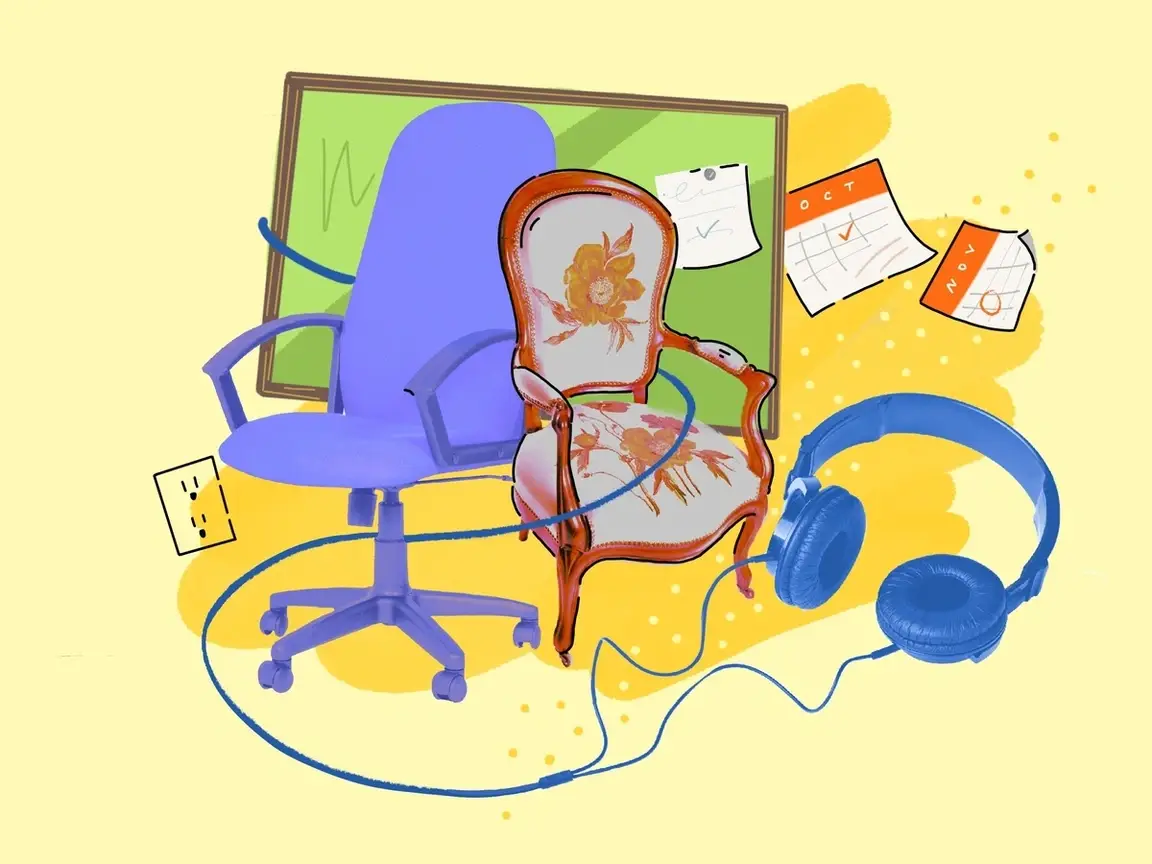9 Design Tips for Successful Remote Work

According to Idealist's most recent survey of job seekers, most people are looking for remote work or hybrid opportunities in their next role. But for many of us, it has become increasingly clear that our current at-home setups aren’t cutting it as home offices.
So what do you do if your space is falling short, but you’re pursuing remote work for the foreseeable future? Or if you and your partner have to share the dining room table or a living room couch for work? Or if your housemates do at-home workouts in the middle of the work day?
Here are some ways to adjust your setup when you don’t have much space.
Find the accessories and technology solutions that you need
If you don’t have a home office, there are a few office and tech products that can make working remotely more comfortable and productive. You can also inquire with your employer about whether they’ll reimburse your work-from-home expenses.
- Consider a laptop stand. If you’re going to be working from a chair, couch, or (as a last resort) a bed, a laptop stand can provide stability so you can type comfortably and have a level base for video calls. You can also use one on a table if you prefer a higher screen, or to make room for other accessories.
- If you’re sharing a space with others, headphones are a must. And even if you’re working alone, a noise cancelling pair may help you focus and drown out outside distractions like leaf blowers or sirens.
- No matter where you’re sitting, make sure you’re comfortable. A kitchen chair is not designed for eight hours of sitting, so you may have to swap one out for a compact office chair for the time being. If your office is nearby, consider asking your supervisor or HR department if you can go by the office to pick up your desk chair so that you can continue to use it for as long as you’ll be working from home.
Storage solutions when there’s no room for more furniture
Are you overwhelmed with paper, but don’t have a place to file documents? You don’t need to make major investments or adjustments; just be strategic with your use of space.
- Box files are great because you can put them away in a closet whenever you need them out of the way. There are lots of styles and you can choose one with hanging folders or accordion pockets.
- Think vertical and see if you have any available wall space that can accommodate shelving. A quick search for “pegboard” on Pinterest can give you an idea of how this material can be used for office organization in really tight spaces. You can hang small items or even lightweight shelves and baskets, leaving you with more desk and floor space.
- You may have to get creative. Set aside a dresser drawer, repurpose a kitchen cupboard, or make room for under-the-bed storage. It may not be ideal, but it will free your space from clutter.
Sharing a small space with others
Not everyone has a dedicated space to work undisturbed. If you have to share limited space, it’s important to keep a few things in mind:
- Be clear on everyone’s schedule. A shared Google calendar can be really helpful. If one person has an important video call scheduled, the other person will know in advance and can plan to work in another part of the home at that time. Set boundaries so that roommates or family know that you’re at work, even if you’re at the kitchen table or sitting on the other side of the living room.
- Be flexible. In a small home there may be only one table that you can share as a workspace. You’ll probably have to make some compromises. Maybe your partner likes the room temperature set cooler, or you prefer different lighting. You’ll both have to live with some things being not quite how you like them. Try to alternate workspaces throughout the day so that everyone has a little private time and shared time.
- Be respectful. Clean up your workspace at the end of the day. Shut down your laptop and put it away, file your papers away, collect your coffee mugs, and hide away cords and chargers. This is also a good way to turn off your work brain (which is difficult enough even at the best of times).
As you get more acclimated to the remote work lifestyle, it will get easier to know what you need (and what you don't!). Even if space is tight and nerves are sometimes frayed, smart organization and good communication go a long way in making working from home more doable.
***
Do you have any hacks for managing work in a tight or shared space? Let us know in the comments!
Lakshmi Hutchinson is a freelance writer with experience in the nonprofit, education, and HR fields. She is particularly interested in issues of educational and workplace equity, and in empowering women to reach their professional goals. She lives in Glendale, California with her husband, twin girls, and tuxedo cat.






